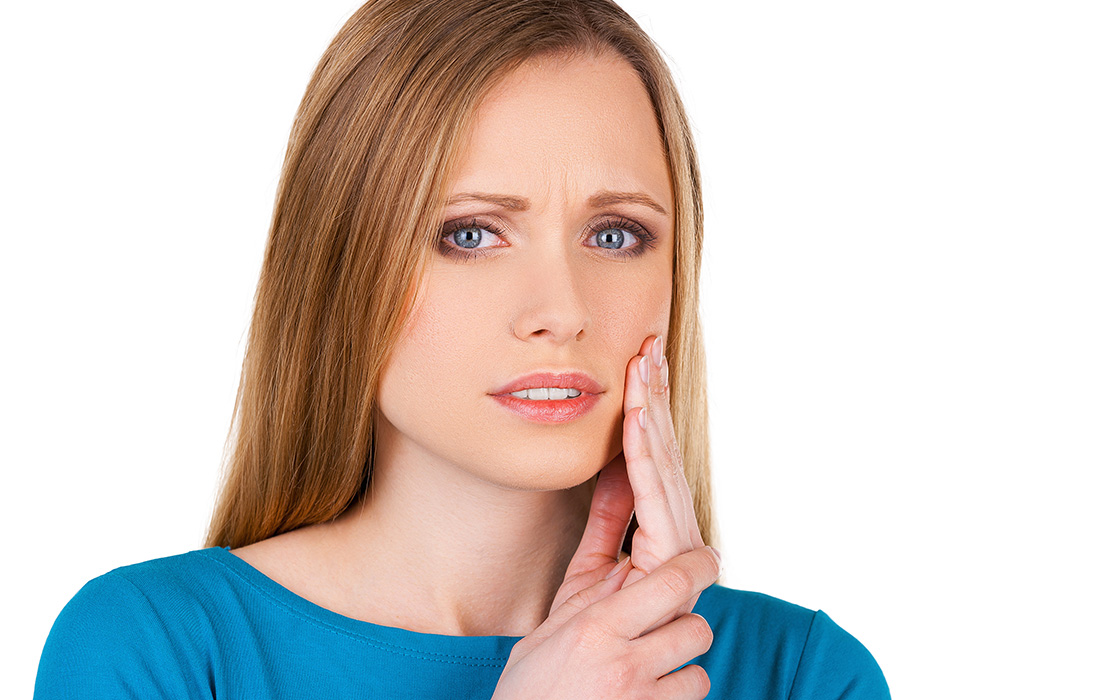Tooth Sensitivity: Why People Experience It
Tooth sensitivity is a very common, yet preventable, issue that is experienced by many patients. When it comes to sensitivity, there is a nerve in the centre of your tooth. This nerve is covered by a layer of dentin and an outer layer of enamel. The closer you get to this nerve, the more sensitive your teeth will become. The enamel that covers your tooth is designed to protect against changes in temperature, but when you wear through this layer or have receding gums that expose the root, you will feel a much higher intensity of sensitivity. The solution to sensitive teeth is figuring out what is causing the sensitivity. Thus, we can treat that cause and decrease your pain.
Here’s 8 reasons why people have sensitive teeth:
1. Clenching and Grinding
Clenching and Grinding are common issues that can sometimes be caused by stress or anxiety. For those who clench or grind their teeth will most likely do so at night because they are not conscious of their actions. Grinding at night is traumatic to your tooth and the supporting bone and gums, which can lead to sensitivity. It is important to understand causes for this and find options to relieve stress or anxiety in your life. In some cases a night guard is prescribed, so that the pressure put on your muscles, joints and teeth will transmit to the acrylic appliance instead of entirely to your body. This will decrease the muscle and joint fatigue, as well as damage to your teeth. If you are someone that grinds during the day then you will need to be conscious of trying to keep your teeth apart. Clenching and/or grinding will cause extensive wear and tear on your teeth. As a result, it’ll lead to exposed dentin/nerves and the development of cracks and fractures.
2. Gingivitis and Periodontitis
When you have gum disease, also known as gingivitis, the gums are constantly in a state of inflammation and this can be irritating to your teeth as well. If left untreated it can lead to bone loss and receding gums, known as periodontitis, which can lead to sensitivity and tooth mobility.
3. Aggressive brushing
Excessive pressure when brushing, or excessive stiffness of toothbrush bristles, can result in damage to the surface of your tooth. As the enamel layer begins to wear away, the tooth will become more sensitive. It is important to have a proper technique so you can brush effectively. Another alternative for aggressive brushers is to use an electric toothbrush as you do not need to manually scrub and they also come equipped with pressure sensors to alert you if you are applying excessive pressure.
4. Acidic Foods
Acidic foods can lead to tooth sensitivity because they can lead to erosion of the enamel surface. Ideally you would minimize exposure to these foods if possible, but drinking milk after consuming these foods may help with acidity as well.
5. Bleaching
Tooth whitening products can lead to sensitive teeth if the products are too strong or used too frequently. Also, if you have tooth decay the whitening products can lead to sensitivity.
6. Post Dental Treatment
There are certain procedures, such as fillings, root canals, or crowns, where you can have some sensitivity after the you start or complete the procedure. This is normal and will usually subside within a couple of weeks. If the sensitivity is present when you apply biting pressure as well than your bite may be high, in which then we recommend that you return to have a quick adjustment.
7. Chipped or Cracked Tooth
A chipped tooth can lead to sensitivity because you’ve exposed the underlying dentin layer. In some cases, you can have an exposed nerve as well. It is important to see a dentist right away if you experience trauma because we need to assess the health of the teeth and supporting structures. There are times when a crack is clearly visible when you remove an existing filling.
8. Decay
When you have decay on the surface of the tooth the enamel is softened, which can lead to a hole in your tooth. This leads to sensitivity because the cold or hot liquids can reach much closer to the nerve relative to a healthy tooth. This can be a new area of decay or underneath an existing filling. After you complete a filling, you should feel relief from this sensitivity.
There are a variety of products available that will decrease the sensitivity of your teeth. Desensitizing toothpastes are a great option to help with tooth sensitivity, there are many different brands available. A fluoride varnish is also available at our office which helps to seal up the surface of the tooth. As well, it acts as an insulation towards changes in temperature. We can also place dental bonding on to the surface to seal it up as well. All of these modalities are temporary in nature and need to reapplied over a period of time depending on which one you use. There are many options to help with tooth sensitivity. It is best to book an appointment with Dedicated Dental Care, your trusted Abbotsford dentist, so we can understand your specific situation and provide a tailored treatment plan.

